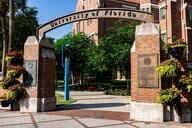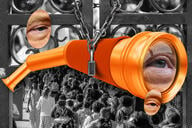You have /5 articles left.
Sign up for a free account or log in.

Istockphoto.com/gocman
"There's no good time for a pandemic," said Jon Boeckenstedt, vice provost for enrollment management at Oregon State University. "But for admissions, this has got to be the worst time."
The time is right now, when colleges are admitting students and hoping they will say yes.
The first thing he thinks of is the economy. Not in the belief that a bad economy is good for higher education because more people seek an education. That may or may not be true this year. What he's focused on is the service economy, which has been devastated by the closures of restaurants and bars all over the country. Not only do the parents of some students work in restaurants, but many students work part-time in restaurants to pay for college.
Wealthier colleges and universities, and the generally wealthy students they enroll, will be hurt by falling endowment values, he said. But he keeps coming back to the service workers getting laid off.
He's thinking of a working-class student working in a restaurant to pay the bills, and probably not working anymore. Some may not enroll.
What this makes uncertain is yield, the percentage of admitted applicants who will enroll. Colleges work very hard on their yield estimates, but this year, there is no way of knowing what will happen.
Oregon State may have been the first college to move back the reply date for students to let a college know they are enrolling, from May 1 (the standard date) to June 1.
Will parents say they don't want a child going far away this year? Will that help or hurt a public institution like Oregon State?
Then there's the question of when colleges will resume normal activity. Could the fall be online? "Every university is thinking about it," Boeckenstedt said. But what impact would that have on yield?
These are early days for colleges in responding to the coronavirus in admissions. So far, the change in date from May 1 to June 1 seems to be attracting support.
Eric Nichols, vice president of enrollment at Loyola University Maryland, said he moved Loyola's response date back because "the reality is that families need more time to make a decision."
He said he discussed another option -- just letting those who request more time have it -- but decided that would be unfair to low-income students. "They are not savvy enough to even ask for an extension," he said.
Other colleges that have moved dates back include Hamline University; the Rochester Institute of Technology; Southwestern University, in Texas; and Williams College. Generally, the most competitive colleges (with the exception of Williams) are not moving their dates.
At the same time, a few colleges are going test optional and citing the coronavirus. See related story in "Admissions Insider."
Then there is the question of orientation. Loyola has four orientations -- from June 18 to June 30. Nichols said the college is committed to providing something for new students, but it may be online.
Ian Mortimer, vice president for enrollment management at RIT, said "the No. 1 lens" for him during this period has been the prospective student's and his or her family.
"We have a responsibility to them," he said.
RIT assumes that many of its new students (and continuing students) have changed economic situations that will require more money. "We're going to try," he said.
Changes in High School Transcripts
One issue that will face colleges soon concerns high school transcripts. Some of the students RIT and others admitted are uncertain if and when they will receive a high school diploma because students are at home. Generally, federal regulations require that students have earned a high school diploma or equivalent to receive financial aid.
Other issues are raised by the way many high schools (and colleges) are going to pass-fail for the courses students are completing via distance education, even though they didn't start that way.
Mortimer said that there are very good reasons for offering those courses pass-fail, but that colleges will need to think about evaluating transcripts that are appreciably different from those in the past.
Surveys
Admissions officers are deeply worried about the potential impact of the coronavirus on enrollment, a new survey suggests.
Asked to rank their prospects for the yield -- the percentage of admitted applicants who will enroll -- 43 percent of enrollment leaders answered 5, on a scale of 1 to 5, with 5 being the worst. And 32 percent answered 4.
Those are among the answers to a survey released by EAB on Tuesday on admissions in the era of the coronavirus.
EAB released answers from 257 four-year colleges, 64 percent of them private, and not all of them EAB clients. The colleges are roughly an even split among selective, most selective and least selective institutions.
A large majority of those answering -- 87 percent -- worry that future visits to the campus by potential students will decline.
This year, 36 percent saw a decline in visits, 50 percent saw no decline and 15 percent were unsure.
Many colleges have been adding online programs for newly admitted applicants or other potential applicants in light of this year's health issues.
- 62 percent are adding video conferences.
- 54 percent are promoting their virtual tour.
- 46 percent are adding social media platform live events.
- 43 percent are increasing the number of social media live events already scheduled.
- 26 percent are adding a virtual tour.
Travel is a norm in admissions.
But according to the survey, 46 percent of respondents are limiting travel by geography, 48 percent are reducing time spent on the road, 48 percent are limiting college-fair participation, 43 percent are canceling planned yield programs, 34 percent are reducing off-campus yield events and 22 percent are canceling off-campus programs. Only 19 percent of respondents indicated they were not adjusting spring recruitment travel.
Most enrollment leaders are working on a scenario for dealing with students who are not able to complete high school this year due to the coronavirus. Currently, only 5 percent of respondents have a plan, but 65 percent are working on a plan.
International Students
One of the biggest concerns of admissions officials this month is the impact of travel restrictions on international enrollments.
Twenty-eight percent of respondents said that they are bringing down their yield projections in an expectation that fewer international students will be able to arrive next fall. Twenty-seven percent of the survey respondents are admitting more domestic students to compensate for the decline in international students.
Among respondents' strategies for dealing with uncertainty about international students:
- 18 percent said they are deferring admission for students from countries most impacted by coronavirus.
- 12 percent are admitting more international students to "mitigate melt risk."
- 7 percent are extending deposit dates and/or offering refunds.
- 6 percent are expanding the domestic student wait list
- 4 percent are expanding their international student wait list.
Another Survey
A second survey released Thursday found that 25.7 percent of high school seniors were rethinking their college choice because of the coronavirus. The survey, distributed through high school and independent counselors, and on social media, featured responses from 300 students. It was sent by two companies, Quatromoney and TuitionFit.
The students said that they wanted to consider options closer to home (32.9 percent), and 21.9 percent of the students said that they feared getting the coronavirus at their original first-choice college.




